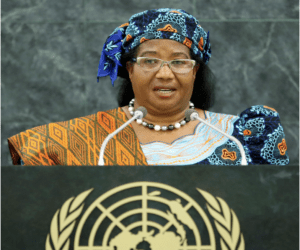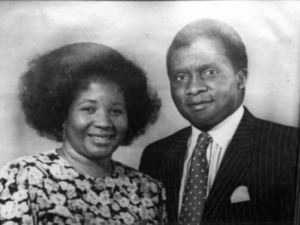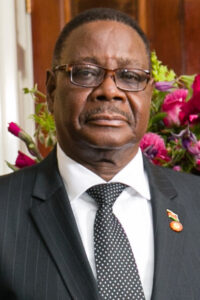
The Will to Shatter the Glass Ceiling
Whenever there is a vacancy in the Office of the President, the First Vice-President shall assume that office for the remainder of the term and shall appoint another to serve as First Vice-President for the remainder of the term. — Section 83, Subsection 4 of the Malawi Constitution
When President of Malawi, Bingu wa Mutharika died on 5 April 2012, it set in motion a constitutional crisis in the country. Mutharika had been president of the small nation for eight years, and several of his more recent activities were concerning to international observers.
A year before his death he expelled the British High Commissioner Fergus Cochrane-Dyet when a diplomatic cable was leaked to the public. Cochrane Dyet had expressed concern that Mutharika was, “becoming ever more autocratic and intolerant of criticism.” Expelling diplomats because they express concern over intolerance of criticism does nothing to allay fears that a government is becoming intolerant of criticism. The expulsion was followed by the United Kingdom tossing out Malawi’s ambassador and immediate shutdown of British aid. At the time of Mutharika’s death, aid was shutdown from the UK, the US, the EU, Germany, Norway, the World Bank, and the African Development Bank.
Many of the deceased president’s problems started with a sudden feud that erupted with his First Vice-President, Joyce Banda in 2010.

Banda is a woman used to smashing through glass ceilings. In the 1970s, living in Kenya with her abusive first husband, she recognized the relationship problems and instead of consigning herself to an abusive marriage because of her children as so many women did, she chose to leave. There was no easy path for a single mother in Africa in the 1970s, but Banda then chose to educate herself.
A second marriage, this time to Richard Banda, resulted in two more children.

In 1999, Joyce Banda entered politics. First elected to the Malawi Parliament as a member of the United Democratic Front Party (UDF), Banda was appointed the Minister for Gender and Community Services. She immediately jumped into the position with both feet, and in 2006 was successful in pushing through The Prevention of Domestic Violence Act, which provided a framework in which to act on different aspects of abuse.
She designed the National Plan for Action on Orphans and Vulnerable Children, and began a zero tolerance campaign against child abuse.
Banda was re-elected in 2004, and this time was appointed Minister of Foreign Affairs. As the minister, she was instrumental in changing Malawi’s recognition of the Chinese government from the Republic of China in Taiwan to the People’s Republic of China.
In 2005 a mass exodus of UDF party members headed for a new party – the Democratic Progressive Party (DPP). Banda switched parties as well, and ran on the new DPP ticket for the office of First Vice-President. The DPP won, with Bingu wa Mutharika as President, and Joyce Banda as First Vice-President. The semantics of the situation proved to be crucial one year later when Mutharika had Banda fired from her position in order to be replaced by his brother, Peter.

Banda and other DPP members were fired for unspecified charges of “anti-party activities.” But insisting that the President was violating the constitution by attempting to fire her, Banda fought back. The high court and the Malawi Law Society agreed with her, finding that a Vice-President elected to the position could not be fired, but could only be displaced through an impeachment process. She could be tossed from the ruling party, but not her position.
Banda formed her own party, the People’s Party, and for the next year-and-a-half a stalemate ensued.
This was why all hell broke loose on the death of President Mutharika.
The problems were vastly compounded by the behavior of Mutharika’s cabinet, determined to keep Banda from entering the presidency no matter what the Malawi Constitution had to say about the matter.
Although Mutharika died of a heart attack during a meeting on 5 April and was pronounced Dead-on-Arrival at hospital (in South Africa, because power cuts made the hospital in Lilongwe unsuitable for a dying head of state), his cabinet held off on announcing the death. They were hoping to buy time in order to facilitate a bypass of Banda’s position, but they did not count on the technological mediums making government secrets ever more difficult.
The news of Mutharika’s death spread like wildfire on Twitter, Facebook, and blogs. People were sending the latest news via messaging apps. No one was as uninformed as the government had counted on them to be.
At midnight on 6 April, six of the Malawi government ministers appeared on television to announce that President Mutharika was “not well” and that Banda was not eligible to succeed him. These ministers, known as the Midnight Six, announced that the new President of Malawi was Peter Mutharika.
But Joyce Banda had other plans. Already she had contacted the head of the Malawi Army, General Henry Odillo, who agreed to send troops to protect her. On 7 April the Midnight Six sought a court order to stop her from taking office, but were unsuccessful.
Foreign nations also weighed in, with the US expressing alarm and supporting the Banda presidency openly.
On 7 April 2012, Banda was sworn in at the National Assembly , and within the month she had seated her cabinet. She was the first women to ever serve as President of Malawi, and only the second woman to serve in an executive office on the continent of Africa.
“The coup plot was against this country,” Banda said. “Not me. It’s a national issue.”
In March 2013, several of those who had participated in the attempted coup by the Midnight Six were arrested, including Henry Mussa.
“I ask for forgiveness from Malawians and I apologize to them for my involvement in the whole thing. We shamed the nation and ou statement was an act of ignorance and stupidity,” Mussa said in a public statement.
Banda then jumped into serving as president, making it a priority to heal the relationships between Malawi and several other nations, which had been greatly strained during the last years of the Mutharika presidency.
The month after taking office, she also attempted to decriminalize homosexuality, by suspending the laws regulating arrest of those known to have committed homosexual acts. This met fierce opposition, and by 5 November the police were ordered to resume arrest of homosexuals. The laws against homosexuality continue in Malawi today.
On the advice of the International Monetary Fund, Banda also devalued the Kwacha. This act created a deep resentment, which was compounded by the discovery of several government members caught stealing government funds.
Known as the Capital Hill Cashgate Scandal, Banda sacked her cabinet on 10 October 2013 in order to deal with the corruption, but was unable to escape guilt by association.
Banda was defeated in the 2014 election by Peter Mutharika, and her attempt to nullify the election did not pan out. It was an election that was more of a referendum on her gender than her leadership abilities – with phrases like, “a woman cannot lead a country,” and “a cow cannot pull the cart.” Over and over it was repeated that “the head of the house is a man.”
After the election, Banda left Malawi until 2008, as a distinguished fellow at the Woodrow Wilson Center. She never stopped her advocacy for women’s rights, arguing for earlier intervention in childhood and more maternal health programs. One of her more controversial platforms has to do with household income. Banda’s reasoning is solidly based on the needs of children.
“When there is no income into the household, the girl-child is the first victim.”
Listed by Forbes Magazine in 2014 as the 40th most powerful woman in the world, and the most powerful woman in Africa, Joyce Banda’s legacy is still not fully formed. The Joyce Banda Foundation is a powerful actor and advocate for children and Malawian households, while the National Association of Business Women, which she founded in 1990, is educating, advocating, and connecting women and giving them a path up from poverty and powerlessness.
To read more about the history of Africa, please click here.
- April 12, 2021
- Culture , History , Interesting
